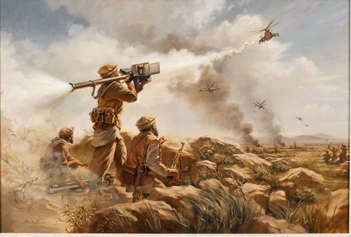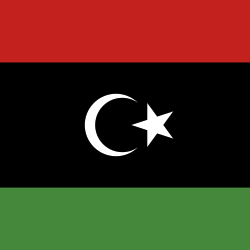Amid post-Vietnam War plans to rebuild relations secretly with Cuba, U.S. Secretary of State Henry Kissinger made a sudden U-Turn and began planning for an overwhelming attack on Cuba, following Castro’s intervention in the Angola Civil War, say historians in a new book reviewing a new round of declassified documents (reported on in The New York Times).
Kissinger was furious by early 1976 — as President Ford was seeking his own term after the fallout of Watergate and battling a primary challenge by Ronald Reagan — about the Cuban opposition to the U.S.-supported Apartheid South African military interventions being staged from neighboring Namibia (then Apartheid South Africa’s illegally-occupied territory of South-West Africa). Zaire’s dictator, Mobutu, was also being encouraged by the United States to invade Angola. Communist China — in the middle of more public U.S. outreach efforts — was also providing military advisers earlier than Cuba, but they were being provided to help the same sides of the civil war that the U.S. and its allies had decided to back, because China wanted to oppose the Soviet/Cuban-supported side. Military advisers from the CIA were also on the ground, alongside the South African regime’s advisers. Most of the U.S. involvement in Angola at the time was a secret, whereas the Cuban deployment of advisers and then thousands of combat troops was very public. The U.S. also mistakenly believed there was a much greater level of cooperation between Cuba and the USSR on the intervention than later proved to be the case.
Here’s the BBC summary of the development regarding a proposed U.S. attack on Cuba in response to the Angola situation:
But the newly released documents show he was infuriated by Cuban President Fidel Castro’s decision in late 1975 to send troops to Angola to help the newly independent nation fend off attacks from South Africa and right-wing guerrillas.
[…]
“I think we are going to have to smash Castro,” Mr Kissinger told Mr Ford in a White House meeting in February 1976, adding Mr Ford should defer action until after the presidential election that November. “I agree,” Mr Ford said.
US contingency plans drawn up on the options warned any military aggression by the US in Cuba could lead to a direct confrontation with the USSR.
“The circumstances that could lead the United States to select a military option against Cuba should be serious enough to warrant further action in preparation for general war,” one document said.
The plans were never undertaken, as Jimmy Carter was elected president that year.
The bottom line here is that the election of President Carter in November 1976 — in a very hard-fought campaign Ford nearly won — appears to have stopped a U.S. war with Cuba and possibly the USSR itself.
But there are more details (see the full New York Times report) indicating knowledge that the assault might fail to topple the regime, would probably result in the destruction or abandonment of the U.S. Naval Base at Guantanamo Bay, and force huge military adjustments in the Caribbean (especially in Puerto Rico), even if the USSR didn’t enter the war. Even so, that didn’t seem to put much of a damper on the plans, as far as we know, even in light of both the Bay of Pigs fiasco and Cuban Missile Crisis in the not-so-distant past at the time, as well as the recent debacle in Vietnam.

Map of Cuba, Angola, South Africa, and South African-occupied South West Africa. Adapted from Egs – Wikimedia






